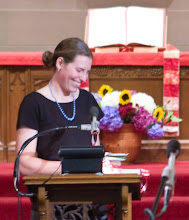October 31, 2010
Seattle Mennonite Church
The writer Anne Lamott has said that she has two basic prayers in her simple Christianity. “Help, help, help” and “Thank you, thank you, thank you.” The scripture for our worship today, Ephesians 1.1-14 falls into the latter category. It is the scriptural expression of our worship theme, that God’s good gifts to us inspire our praise.
As with any text, there are dozens of sides and shapes that make up this scripture both in its time and in our time, but today I want us to learn and remember two things about these first fourteen verses of Ephesians.
First, written into this passage is a certain understanding of the universe, a cosmology. It has something to say about space and time. In the world of the first century, the earth was considered to be the center of the universe with sun, stars, and planets revolving around it and layers of different substances – of death and decay and also fire and air – surrounded the earth.
The writer of Ephesians works within this cosmology – notice how he talks about the heavenly places in verse 3 and also heaven and earth in verse 10. But the writer also transcends this cosmology. God chose us not in and through the world but before the foundation of the world. Before earth or heaven or the big bang or the creation of light and dark. And again in verse ten, God will gather all things into Godself in the fullness of time.
This is an expansive vision of the universe as God’s body. This is a comprehensive vision of God’s redemption and salvation, subverting the dualisms of the world into a greater wholeness. These early Christians in first-century Asia Minor were a minority, but here is a vision that embraces all things, the entire creation in the divine plan with Christians at the center because they belonged to the risen Lord.
And second, this passage is a eulogy. We most often think of eulogies in the context of a funeral, a tribute to somebody who has recently died. But a eulogy is also a speech or piece of writing that praises somebody or something very highly. This is a eulogy to God. Verse 3 – blessed be the God who has blessed us with spiritual blessings; verse 4 – God has chosen us; verse 5 – God has destined us as God’s children and so on… freely bestowing grace, offering forgiveness, lavishing upon us riches.
In the original Greek, verses 3-14 are one sentence in poetic style. This is not dogma or instruction that explains exactly what to think or feel. This is not the time or place where we figure out exactly what forgiveness and redemption and salvation mean. Instead, this is the time and place where we rejoice that we are indeed forgiven, redeemed, and saved. God is worthy of such high praise for all that God has done for us, embracing us in a divine cosmology. These words give us images and themes that suggest God’s intimate and ongoing involvement in our world. We are God’s own people.
And our response is, and appropriately so, “Thank you, thank you, thank you.”
Sunday, October 31, 2010
Subscribe to:
Post Comments (Atom)


No comments:
Post a Comment